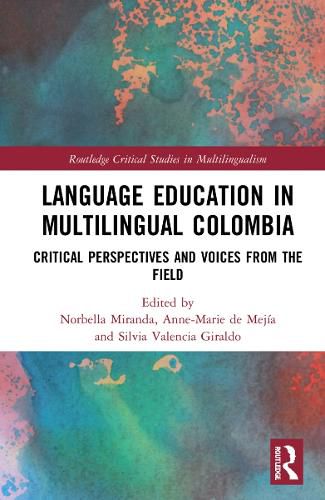Readings Newsletter
Become a Readings Member to make your shopping experience even easier.
Sign in or sign up for free!
You’re not far away from qualifying for FREE standard shipping within Australia
You’ve qualified for FREE standard shipping within Australia
The cart is loading…






This collection brings together cutting-edge research and theoretical discussions on the linguistic, cultural, and political forces that shape multilingual Colombia, highlighting the country's unique sociolinguistic landscape and offering new insights into multilingualism in the Global South.
The volume outlines the changing dynamics of multilingualism in Colombia, where Spanish, Spanish-based and English-based Creoles, the linguistic and cultural heritages of Indigenous communities and migrant groups, and the prevalence of English in language education policy intersect. The chapters explore the implications of policy making on language policy discourse and especially on language teacher education for those working on the margins in urban and rural areas. They also explore existing understandings of interculturality and the work of academics and local communities in minority language revitalization efforts.
Problematizing essentialized views of language and culture and raising awareness around the complex relationship between language, identity, and interculturality in the Global South, this book will be of interest to scholars in multilingualism, sociolinguistics, language education, teacher education, and applied linguistics.
$9.00 standard shipping within Australia
FREE standard shipping within Australia for orders over $100.00
Express & International shipping calculated at checkout
This collection brings together cutting-edge research and theoretical discussions on the linguistic, cultural, and political forces that shape multilingual Colombia, highlighting the country's unique sociolinguistic landscape and offering new insights into multilingualism in the Global South.
The volume outlines the changing dynamics of multilingualism in Colombia, where Spanish, Spanish-based and English-based Creoles, the linguistic and cultural heritages of Indigenous communities and migrant groups, and the prevalence of English in language education policy intersect. The chapters explore the implications of policy making on language policy discourse and especially on language teacher education for those working on the margins in urban and rural areas. They also explore existing understandings of interculturality and the work of academics and local communities in minority language revitalization efforts.
Problematizing essentialized views of language and culture and raising awareness around the complex relationship between language, identity, and interculturality in the Global South, this book will be of interest to scholars in multilingualism, sociolinguistics, language education, teacher education, and applied linguistics.